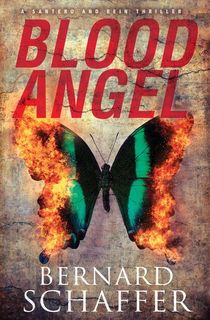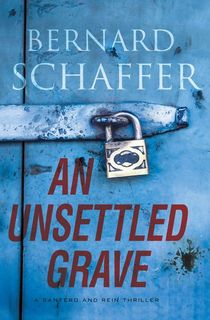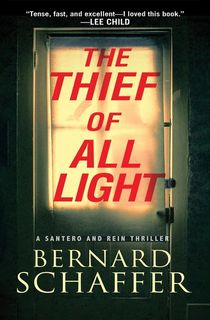Bernard Schaffer is the author of numerous published works. His latest is Blood Angel, book three in the "tense, fast, and excellent" Santero and Rein thriller series (Lee Child). Schaffer is also a full-time police detective. As a twenty-year law enforcement veteran, he is a decorated criminal investigator, narcotics expert, and child forensic interviewer.
We asked Shaffer to discuss his life as an author and real-life investigator. Here's what he had to say.
People always ask if my career as a police detective inspired me to write books. It’s a good question. Every cop I've ever met says, “I’m going to write a book someday.” Over the course of a police career, it's easy to collect enough crazy stories about the strange things people do and the horrors you see, stories that live inside your mind for the rest of your life, stories that you feel compelled to tell other people about.
In my case, however, that doesn’t apply. I was a writer long before I became a police officer. It started when I was a little kid. After I graduated high school, I began submitting stories to agents, publishers, and magazines, both great and small.
This was back in the old days of publishing. These were dark ages when manuscripts were typewritten on typewriters and broke authors like myself had to type on both sides of a page after they ran out of paper. A story was just about to get good when the next thing you knew: your typewriter ribbon had run dry.
Once you finally completed a manuscript, you could only send it out to one place at a time. No one accepted simultaneous submissions. You'd mail off your one clean copy that had no typos or white-out and you'd wait. Sometimes you'd hear back and sometimes you wouldn't.
Related: Lori Andrews: How Medical Mystery Books Help Crack the Case of Modern-Day Genetics
In those days, I lugged around an electric typewriter and wrote wherever I could. I wrote in a gas station where I worked as an attendant. I wrote in a security office at a paper factory where I was a guard. I wrote in a weigh station at a trash dump while rats scurried along the windowsill. I wrote and I submitted and I wrote and I submitted and almost none of it was published at all.
So I went into the police academy.
A new thriller by Bernard Schaffer

Blood Angel
AVAILABLE 5/26/20: A detective and a manhunter team up against a madman in this “tense, fast, and excellent” series by the veteran cop and author of An Unsettled Grave (Lee Child, bestselling author of the Jack Reacher series).
"Good writing is informed by an author's life experiences."
Still, I run into a lot of those cops-turned-authors. Several come to mind whom I consider good friends and good writers. They found a way to weave their professional experience into narrative fiction. They are authors, not cops who wrote a book. Their work tells you truths about humanity.
Then there are the other guys. The ones I don’t get along with. The ones who write about a particular case they worked or their time with a specific specialty unit, but they do it in a way that's meant to whine about the system or the people or the hardships they endured. It's nothing more than literary self-glorification and I don’t have time for it.
Related: 9 Perplexing Locked Room Mysteries for the Sleuth at Heart
Good writing is informed by an author's life experiences. Hemingway had war and travel and plane crashes and battles with enormous fish to use as inspiration for his characters. He also had long hours on quiet waters and great loves and terrible divorces and a thousand other losses and victories to use as inspiration. His work is authentic. The same way Harper Lee is authentic. The same way so many other writers both before and after Hemingway and Lee are authentic—while thousands more are not authentic.
"I've never met a Moriarty."
It’s fair to say that a career in criminal investigations is as much a hindrance to writing a thriller or mystery novel as it is a benefit.
In real life, it’s almost never a whodunit. If it is a whodunit, the person who did it usually becomes apparent fairly quickly. Thus, the old cat and mouse game that mystery readers love so much is almost non-existent.
Related: “Some Mysteries are Best Left Alone”
I've never met a Moriarty. I've met a lot of drug dealers and armed robbers and a few murderers who killed their wives. These people are usually desperate and impulsive and selfish and most likely sociopathic. But they aren't master criminals by any stretch of the imagination.
By Bernard Schaffer

An Unsettled Grave
A grisly find in the Pennsylvania woods plunges cops into a cold case, in a novel of “heart-pounding suspense” by the author of The Thief of All Light (Kirkus Reviews).
Even if they are smarter than the average bad guy, their world usually falls apart over something insignificant. For example, I knew a drug dealer who had done very well for himself. We'll call him Jack Stapleton. Stapleton had flown under the radar for years. He owned his house, several nice cars, had significant investments, all thanks to the drug trade, and we had no idea he existed.
Related: 40 Best Sherlock Holmes Quotes Every Sleuth Should Live By
Then one day, a dummy who worked for Stapleton got stopped by a cop. His car was searched and the drugs were found. That guy gave up the drug dealer and set him up and it wasn't long before the house, the vehicles, the investments, and all the stacks of cash hidden under the mattress were seized by authorities. If he'd have actually owned a hound of the Baskervilles, we'd have seized that too. All those years of criminal effort were gone in a matter of weeks, and it wasn't even that hard to do.
"To beat you, we've just got to get it right one time."
I'm a big fan of boxing, and there's a saying in boxing that seems particularly applicable to cops and criminals.
Sometimes a technical boxer who likes to dance around the ring and jab but has no knockout power comes up against a hard puncher. That hard puncher might lose every round on points right up until he unloads a devastating knockout that ends the fight.
Related: What It’s Like to Be Followed
The saying is: The boxer has to be perfect for all twelve rounds. The puncher just has to be perfect for a few seconds.
That's like cops and criminals. To beat us, you've got to be perfect your whole criminal life. To beat you, we've just got to get it right one time.
By Bernard Schaffer

The Thief of All Light
This police thriller “launches a stunning series with two of the most original heroes ever—as well as a killer who sets a new standard for lethal danger” (Lisa Scottoline, New York Times–bestselling author of Someone Knows).
The other question people want to ask is how much of what I write really happened? How much of my experience as a cop is used to create the things I write?
Related: 13 First-in-Series Mysteries to Keep You Entertained
In some ways the answer is all of it. In others, none of it. You see, I have no interest in using my writing to inform humanity about my real experiences as a cop. Instead, my real-life experiences as a cop inform my writing about humanity.
Maybe not in the best way. Maybe not in the most comfortable way. But always, one hopes, in a way that's authentic.
Bernard Schaffer is an author, a decorated criminal investigator, a narcotics expert, a child forensic interviewer, and a father of two. His latest book, Blood Angel, is available everywhere on 5/26/20.
